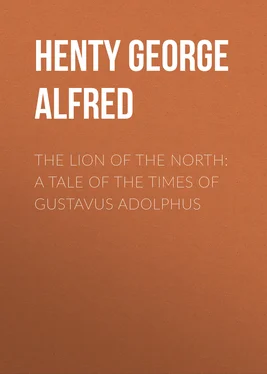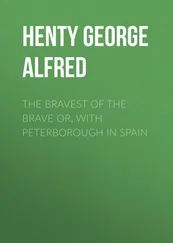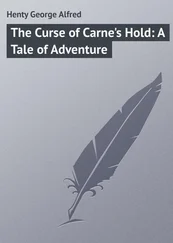George Henty - The Lion of the North - A Tale of the Times of Gustavus Adolphus
Здесь есть возможность читать онлайн «George Henty - The Lion of the North - A Tale of the Times of Gustavus Adolphus» — ознакомительный отрывок электронной книги совершенно бесплатно, а после прочтения отрывка купить полную версию. В некоторых случаях можно слушать аудио, скачать через торрент в формате fb2 и присутствует краткое содержание. Жанр: Альтернативная история, foreign_antique, foreign_prose, Исторические приключения, на английском языке. Описание произведения, (предисловие) а так же отзывы посетителей доступны на портале библиотеки ЛибКат.
- Название:The Lion of the North: A Tale of the Times of Gustavus Adolphus
- Автор:
- Жанр:
- Год:неизвестен
- ISBN:нет данных
- Рейтинг книги:4 / 5. Голосов: 1
-
Избранное:Добавить в избранное
- Отзывы:
-
Ваша оценка:
- 80
- 1
- 2
- 3
- 4
- 5
The Lion of the North: A Tale of the Times of Gustavus Adolphus: краткое содержание, описание и аннотация
Предлагаем к чтению аннотацию, описание, краткое содержание или предисловие (зависит от того, что написал сам автор книги «The Lion of the North: A Tale of the Times of Gustavus Adolphus»). Если вы не нашли необходимую информацию о книге — напишите в комментариях, мы постараемся отыскать её.
The Lion of the North: A Tale of the Times of Gustavus Adolphus — читать онлайн ознакомительный отрывок
Ниже представлен текст книги, разбитый по страницам. Система сохранения места последней прочитанной страницы, позволяет с удобством читать онлайн бесплатно книгу «The Lion of the North: A Tale of the Times of Gustavus Adolphus», без необходимости каждый раз заново искать на чём Вы остановились. Поставьте закладку, и сможете в любой момент перейти на страницу, на которой закончили чтение.
Интервал:
Закладка:
Time after time the Austrians attempted to carry the place, and were always hurled back, although outnumbering the Scots by nigh twenty to one. At last the town was in ruins, and was on fire in a score of places. Its streets and lanes were heaped with dead, and it was no longer tenable. Munro therefore gave orders that the houses should everywhere be set on fire, and the troops fall back to the castle.
Steadily and in good order his commands were carried out, and with levelled pikes, still facing the enemy, the troops retired into the castle. The Imperial general, seeing how heavy had been his losses in carrying the open town, shrank from the prospect of assaulting a castle defended by such troops, and when night fell he quietly marched away with the force under his command.
CHAPTER III SIR JOHN HEPBURN
Munro’s first care, when he found that the Imperialists had retreated in the direction of Colberg, was to send out some horsemen to discover whether the Swedes were in a position to cover that town. The men returned in two hours with the report that Field Marshal Horn, with the Swedish troops from Stettin, had joined Kniphausen and Hepburn, and were guarding the passage between the enemy and Colberg.
Two days later a message arrived to the effect that Sir Donald Mackay, who had now been created Lord Reay, had arrived to take the command of his regiment, and that Nigel Graheme’s company was to march and join him; while Munro with the rest of his command was to continue to hold the Castle of Schiefelbrune.
Shortly afterwards General Bauditzen arrived with 4000 men and 18 pieces of cannon to press the siege of Colberg, which was one of the strongest fortresses in North Germany. On the 13th of November the news arrived that Montecuculi was again advancing to raise the siege; and Lord Reay with his half regiment, Hepburn with half his regiment, and a regiment of Swedish infantry marched out to meet him, Kniphausen being in command. They took up a position in a little village a few miles from the town; and here, at four o’clock in the morning, they were attacked by the Imperialists, 7000 strong. The Swedish infantry fled almost without firing a shot, but the Scottish musketeers of Hepburn and Reay stood their ground.
For a time a desperate conflict raged. In the darkness it was utterly impossible to distinguish friend from foe, and numbers on both sides were mown down by the volleys of their own party. In the streets and gardens of the little village men fought desperately with pikes and clubbed muskets. Unable to act in the darkness, and losing many men from the storm of bullets which swept over the village, the Swedish cavalry who had accompanied the column turned and fled; and being unable to resist so vast a superiority of force, Kniphausen gave the word, and the Scotch fell slowly back under cover of the heavy mist which rose with the first breath of day, leaving 500 men, nearly half their force, dead behind them.
Nigel Graheme’s company had suffered severely; he himself was badly wounded. A lieutenant and one of the ensigns were killed, with thirty of the men, and many others were wounded with pike or bullet. Malcolm had had his share of the fighting. Several times he and the men immediately round him had been charged by the Imperialists, but their long pikes had each time repulsed the assaults.
Malcolm had before this come to the conclusion, from the anecdotes he heard from the officers who had served through several campaigns, that the first quality of an officer is coolness, and that this is even more valuable than is reckless bravery. He had therefore set before himself that his first duty in action was to be perfectly calm, to speak without hurry or excitement in a quiet and natural tone.
In his first fight at Schiefelbrune he had endeavoured to carry this out, but although he gained much commendation from Nigel and the other officers of the company for his coolness on that occasion, he had by no means satisfied himself; but upon the present occasion he succeeded much better in keeping his natural feelings in check, forcing himself to speak in a quiet and deliberate way without flurry or excitement, and in a tone of voice in no way raised above the ordinary. The effect had been excellent, and the soldiers, in talking over the affair next day, were loud in their praise of the conduct of the young ensign.
“The lad was as cool as an old soldier,” one of the sergeants said, “and cooler. Just as the Austrian column was coming on for the third time, shouting, and cheering, and sending their bullets in a hail, he said to me as quietly as if he was giving an order about his dinner, ‘I think, Donald, it would be as well to keep the men out of fire until the last moment. Some one might get hurt, you see, before the enemy get close enough to use the pikes.’ And then when they came close he said, ‘Now, sergeant, I think it is time to move out and stop them.’ When they came upon us he was fighting with his half pike with the best of us. And when the Austrians fell back and began to fire again, and we took shelter behind the houses, he walked about on the road, stooping down over those who had fallen, to see if all were killed, and finding two were alive he called out, ‘Will one of you just come and help me carry these men under shelter? They may get hit again if they remain here.’ I went out to him, but I can tell you I didn’t like it, for the bullets were coming along the road in a shower. His helmet was knocked off by one, and one of the men we were carrying in was struck by two more bullets and killed, and the lad seemed to mind it no more than if it had been a rainstorm in the hills at home. I thought when we left Nithsdale that the captain was in the wrong to make so young a boy an officer, but I don’t think so now. Munro himself could not have been cooler. If he lives he will make a great soldier.”
The defence of the Scots had been so stubborn that Montecuculi abandoned his attempt to relieve Colberg that day, and so vigilant was the watch which the besiegers kept that he was obliged at last to draw off his troops and leave Colberg to its fate. The place held out to the 26th of February, when the garrison surrendered and were allowed to march out with the honours of war, with pikes carried, colours flying, drums beating, matches lighted, with their baggage, and with two pieces of cannon loaded and ready for action. They were saluted by the army as they marched away to the nearest town held by the Austrians, and as they passed by Schiefelbrune Munro’s command were drawn up and presented arms to the 1500 men who had for three months resisted every attempt to capture Colberg by assault.
Nigel Graheme’s wound was so severe that he was obliged for a time to relinquish the command of his company, which he handed over to Herries.
As there had been two vacancies among the officers Malcolm would naturally have been promoted to the duties of lieutenant, but at his urgent request his uncle chose for the purpose a young gentleman of good family who had fought in the ranks, and had much distinguished himself in both the contests. Two others were also promoted to fill up the vacancies as ensigns.
The troops after the capture of Colberg marched to Stettin, around which town they encamped for a time, while Gustavus completed his preparations for his march into Germany. While a portion of his army had been besieging Colberg, Gustavus had been driving the Imperialists out of the whole of Pomerania. Landing on the 24th of June with an army in all of 15,000 infantry, 2000 cavalry, and about 3000 artillery, he had, after despatching troops to aid Munro and besiege Colberg, marched against the Imperialists under Conti. These, however, retreated in great disorder and with much loss of men, guns, and baggage, into Brandenburg; and in a few weeks after the Swedish landing only Colberg, Greifswald, and Demming held out. In January Gustavus concluded a treaty with France, who agreed to pay him an annual subsidy of 400,000 thalers on the condition that Gustavus maintained in the field an army of 30,000 infantry and 6000 cavalry, and assured to the princes and peoples whose territory he might occupy the free exercise of their religion. England also promised a subsidy, and the Marquis of Hamilton was to bring over 6000 infantry; but as the king did not wish openly to take part in the war this force was not to appear as an English contingent. Another regiment of Highlanders was brought over by Colonel John Munro of Obstell, and also a regiment recruited in the Lowlands by Colonel Sir James Lumsden.
Читать дальшеИнтервал:
Закладка:
Похожие книги на «The Lion of the North: A Tale of the Times of Gustavus Adolphus»
Представляем Вашему вниманию похожие книги на «The Lion of the North: A Tale of the Times of Gustavus Adolphus» списком для выбора. Мы отобрали схожую по названию и смыслу литературу в надежде предоставить читателям больше вариантов отыскать новые, интересные, ещё непрочитанные произведения.
Обсуждение, отзывы о книге «The Lion of the North: A Tale of the Times of Gustavus Adolphus» и просто собственные мнения читателей. Оставьте ваши комментарии, напишите, что Вы думаете о произведении, его смысле или главных героях. Укажите что конкретно понравилось, а что нет, и почему Вы так считаете.












